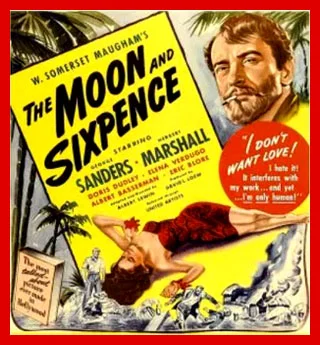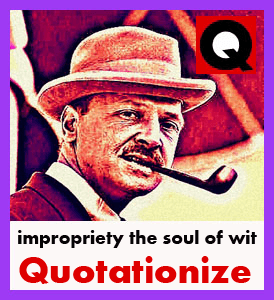This post is about the meaning of impropriety is the soul of wit, as found in Maugham’s work.
The popular quote: “…impropriety is the soul of wit…” is from the novel “The Moon And Sixpence” written by William Somerset Maugham.
(The Moon And Sixpence By W. Somerset Maugham, Mineola, New York: Dover Publications Inc., 1995, Ch. IV, P. 10) source
(The quote is also found here and here.)
Obviously, this line is a take-off on “…brevity is the soul of wit…” from the play “Hamlet” by William Shakespeare.
This line by ‘The Bard‘ means a funny speech or writing should be short and concise; otherwise, it will lose its sense of humor.
So, what about ‘impropriety is the soul of wit‘ mean?
To start off, the word ‘impropriety‘ use in this line means indecency or obscenity.
‘The soul‘ means the key.
In this quote, the word ‘wit‘ means a natural aptitude for using words and ideas in a quick and inventive way to create humor.
It simply means appropriateness.
Impropriety Is The soul Of Wit Meaning
Now, let’s analyze it in more detail:
The line is from the passage in Chapter Four of the novel.
It was describing a group of friends (all writers) having luncheon and cheerfully engaging in lively conversations.
…we were in a good humour. We talked about a hundred things
The first-person narrator of this story, continued telling us about what some of the characters were chattering about.
The quote is taken from this line:
Mrs. Jay, aware that impropriety is the soul of wit, made observations in tones hardly above a whisper that might well have tinged the snowy tablecloth with a rosy hue
From the description above, we can tell that this female character, Mrs. Jay is an audacious and saucy person among them.
The line, ‘Mrs. Jay, aware that impropriety is the soul of wit‘ means she knew that by sharing salacious stories or jokes (impropriety) would enliven the conversation (wit).
‘Made observations in tones hardly above a whisper‘, means Mrs. Jay shared her improper conversation in a soft voice (a little louder than a whisper).
When English writer Maugham stressed that Mrs. Jay was speaking softly is to imply the inappropriateness or salaciousness of her words in public.
To further accentuate Mrs. Jay’s words were so indecent or vulgar, Maugham wrote ‘that might well have tinged the snowy tablecloth with a rosy hue‘.
In other words, Mrs. Jay’s words were so obscene it would definitely make the pristine white tablecloth blushed with embarrassment.
Maugham brilliantly exploited the literary device called imagery; with the help of the setting of the story.
The tablecloth, to be precise.
Remember the characters were having a rousing luncheon.
So, he took the opportunity to made use of the snow-white luncheon tablecloth of their dining table, that usually got smeared from red wine or food during meal time.
In short, we could metaphorically say: dirty talk with dirty tablecloth.
For those who do not know, this story is based on the life of the French Post-Impressionist painter Paul Gauguin.
The Moon And Sixpence Quotes
Here are more quotes from “The Moon And Sixpence” you should check them out:
“His decent reticence is branded as hypocrisy, his circumlocutions are roundly called lies, and his silence is vilified as treachery.” – W. Somerset Maugham
(The Moon And Sixpence By William Somerset Maugham, New York: George H. Doran Company, 1919, Ch. I, P. 13) source
“The faculty for myth is innate in the human race. It seizes with avidity upon any incidents, surprising or mysterious…” – W. Somerset Maugham
(The Moon And Sixpence By William Somerset Maugham, New York: George H. Doran Company, 1919, Ch. I, P. 10) source
“…the writer should seek his reward in the pleasure of his work and in release from the burden of his thought; and, indifferent to aught else, care nothing for praise or censure, failure or success.” – W. Somerset Maugham
(The Moon And Sixpence By William Somerset Maugham, New York: George H. Doran Company, 1919, Ch. II, P. 16) source
“For in men, as a rule, love is but an episode which takes its place among the other affairs of the day…” – W. Somerset Maugham
(The Moon And Sixpence By William Somerset Maugham, New York: George H. Doran Company, 1919, Ch. XLIII, P. 224) source
“As lovers, the difference between men and women is that women can love all day long, but men only at times.” – W. Somerset Maugham
(The Moon And Sixpence By William Somerset Maugham, New York: George H. Doran Company, 1919, Ch. XLIII, PP. 224-225) source
“Each one of us is alone in the world.” – W. Somerset Maugham
(The Moon And Sixpence By William Somerset Maugham, New York: George H. Doran Company, 1919, Ch. XLII, P. 216) source
“Beauty is something wonderful and strange that the artist fashions out of the chaos of the world in the torment of his soul.” – W. Somerset Maugham
(The Moon And Sixpence By William Somerset Maugham, New York: George H. Doran Company, 1919, Ch. XIX, P. 106) source
“Sometimes people carry to such perfection the mask they have assumed that in due course they actually become the person they seem.” – W. Somerset Maugham
(The Moon And Sixpence By William Somerset Maugham, New York: George H. Doran Company, 1919, Ch. XLII, P. 212) source
“The world is hard and cruel. We are here none knows why, and we go none knows whither.” – W. Somerset Maugham
(The Moon And Sixpence By William Somerset Maugham, New York: George H. Doran Company, 1919, Ch. XXXVIII, P. 189) source
“Life isn’t long enough for love and art.” – W. Somerset Maugham
(The Moon And Sixpence By William Somerset Maugham, New York: George H. Doran Company, 1919, Ch. XXI, P. 117) source
“It is not true that suffering ennobles the character; happiness does that sometimes, but suffering, for the most part, makes men petty and vindictive.” – W. Somerset Maugham
(The Moon And Sixpence By William Somerset Maugham, New York: George H. Doran Company, 1919, Ch. XVII, P. 94) source
“The writer is more concerned to know than to judge.” – W. Somerset Maugham
(The Moon And Sixpence By William Somerset Maugham, New York: George H. Doran Company, 1919, Ch. XLI, P. 203) source
“It was a night so beautiful that your soul seemed hardly able to bear the prison of the body.” – W. Somerset Maugham
(The Moon And Sixpence By William Somerset Maugham, New York: George H. Doran Company, 1919, Ch. LIII, P. 280) source
“Unconsciously, perhaps, we treasure the power we have over people by their regard for our opinion of them, and we hate those upon whom we have no such influence.” – W. Somerset Maugham
(The Moon And Sixpence By William Somerset Maugham, New York: George H. Doran Company, 1919, Ch. XLI, P. 211) source
“…art is a manifestation of emotion, and emotion speaks a language that all may understand.” – W. Somerset Maugham
(The Moon And Sixpence By William Somerset Maugham, New York: George H. Doran Company, 1919, Ch. I, P. 9) source
“Only the poet or the saint can water an asphalt pavement in the confident anticipation that lilies will reward his labour.” – W. Somerset Maugham
(The Moon And Sixpence By William Somerset Maugham, New York: George H. Doran Company, 1919, Ch. XIII, P. 73) source
“When people say they do not care what others thing of them, for the most part they deceive themselves.” – W. Somerset Maugham
(The Moon And Sixpence By William Somerset Maugham, New York: George H. Doran Company, 1919, Ch. XIV, P. 79) source
“I don’t think of the past. The only thing that matters is the everlasting present.” – W. Somerset Maugham
(The Moon And Sixpence By William Somerset Maugham, New York: George H. Doran Company, 1919, Ch. XXI, P. 116) source
“Man’s desire for the approval of his fellows is so strong, his dread of their censure so violent, that he himself has brought his enemy within his gates; and it keeps watch over him, vigilant always in the interests of its master to crush any half-formed desire to break away from the herd. It will force him to place the good of society before his own.” – W. Somerset Maugham
(The Moon And Sixpence By William Somerset Maugham, New York: George H. Doran Company, 1919, Ch. XIV, P. 80) source
“…man, subservient to interests he has persuaded himself are greater than his own, makes himself a slave to his taskmaster.” – W. Somerset Maugham
(The Moon And Sixpence By William Somerset Maugham, New York: George H. Doran Company, 1919, Ch. XIV, P. 80) source
Note: You can read the free e-book “The Moon And Sixpence” over here and here.
Free The Moon And Sixpence Movie

You can watch the 1942 black & white film adaptation of “The Moon And Sixpence” over here or here.
*Here are quotes from A Writer’s Notebook by Somerset Maugham.

